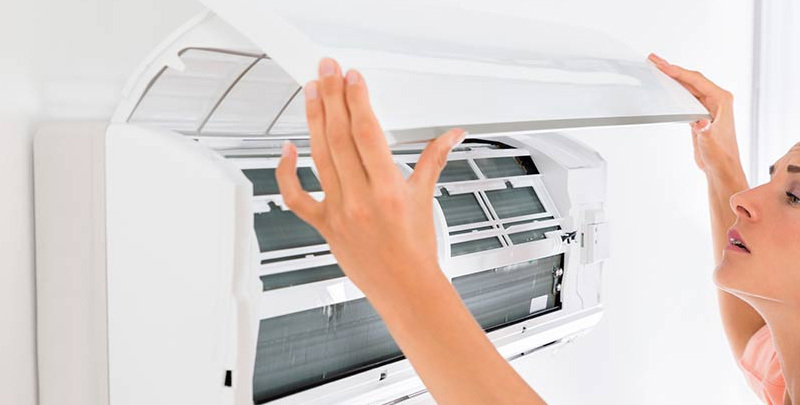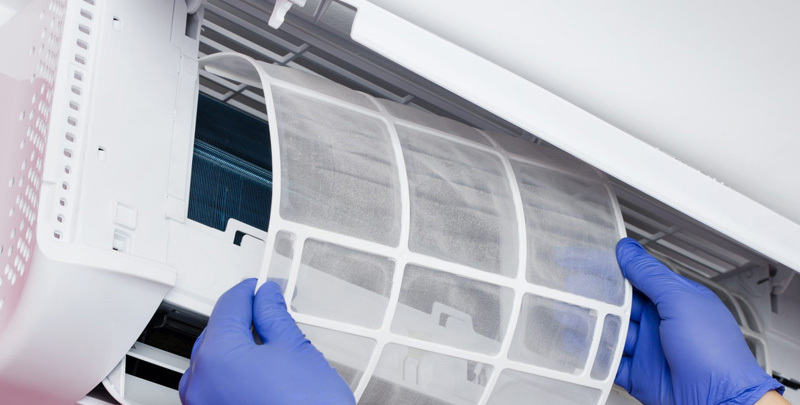Air conditioner air filters are a crucial yet often overlooked component of your cooling system. These humble filters play a vital role in ensuring the air you breathe at home is clean and free from dust, allergens, and pollutants.
In this article, we’ll delve into the world of air conditioner air filters further, focusing on why they are essential to air conditioning systems and the consequences of neglecting them.
The Importance of Air Conditioner Filters
When you turn on your air conditioner, it doesn’t merely circulate cool air; it also filters out particles from the air, such as dust, pollen, smoke, and pet dander. Air filters are your first defense to protect you against airborne contaminants, ensuring that the air circulating inside your home is also healthier to breathe.
Impact of a Dirty or Clogged Filter
However, when these air filters become dirty or clogged, their performance is compromised. The health consequences of a faulty air filter are significant. Reduced airflow to indoor units is one of the first signs you might notice, making your air conditioner unit work harder to cool your home. It not only results in increased energy bills but also places unnecessary strain on your AC unit.
Furthermore, you might start to see dust and debris accumulating around your vents, indicating that the filter is blocked or polluted by moisture and no longer filtering and cleaning it effectively. Perhaps most importantly, a clogged filter can lead to allergies and respiratory issues as it fails to remove allergens and pollutants from the air.
In the following sections, we will explore how to recognise when your own heater or aircon filter needs replacing and provide you with valuable insights into maintaining a healthy and efficient cooling system.

Signs Your Aircon Filter May Need Replacing
- Reduced airflow: One of the most common signs that your air conditioner filter needs replacing is reduced airflow. You might notice that your home used to cool slower and more efficiently. The filter is clogged with dirt and debris, obstructing air passage. When air can’t flow freely through the filter, your AC system has to work harder to maintain the desired temperature, leading to increased energy consumption.
- Increased energy bills: Closely related to reduced airflow are higher energy bills. When your air conditioner struggles to push air to cool your home due to a clogged filter, it consumes more electricity. It translates to a spike in energy costs, an expense you want to avoid.
- Dust and debris around vents: Another visual cue that your aircon filter is due for replacement is the accumulation of dust and debris around the vents. If particles are settling on your vent covers or dust is floating in the air when the AC is running, the filter isn’t effectively capturing and filtering these contaminants.
- Allergies and respiratory issues: Perhaps the most critical sign, especially for the sensitive or those with allergies, asthma or other respiratory problems or sensitivities, is the onset or exacerbation of symptoms. A dirty or clogged filter can’t effectively remove allergens, pollen, and pollutants from the air. It means you’re breathing in more of these irritants, which can lead to allergies, sneezing, coughing, or even more severe respiratory problems.
Understanding Air Filter Types
Aircon filters come in various types, each with its own set of advantages and disadvantages. Understanding the differences between these filter types can help you make an informed choice based on your needs and budget.
- Fibreglass filters: Fibreglass filters are the most common and budget-friendly option. They are typically disposable and capture larger particles, such as dust and dirt. However, they may be less effective at trapping smaller allergens and pollutants.
- Pleated filters: Pleated filters have a larger surface area than fibreglass filters, making them more effective at capturing small particles like pet dander and pollen. They are also disposable, but offer better filtration capabilities.
- HEPA filters: High-Efficiency Particulate Air (HEPA) filters are the gold-standard filters for high-efficiency particulate air and filtration. They can capture over 99% of particles, including bacteria and viruses. HEPA filters are highly effective but come at a higher cost.
When choosing a filter, consider the air quality in your home and any specific filtration needs. Depending on your budget, space, and requirements for AC filters, you can select the most suitable filter type.
How Often Should You Replace Your Aircon Filter?
Determining when to replace your air conditioner filter is essential for maintaining clean and efficient air in your home. While the specific frequency may vary depending on factors like filter type and usage patterns of indoor units, there are general guidelines to follow.

Filter Replacement Frequency
On average, you should replace your air conditioner filter every 1 to 3 months. This guideline applies to both standard filters and disposable filters. However, other factors can influence the replacement intervals.
Factors Affecting Replacement Intervals
The frequency of replacement may be affected by:
- The type of filter you use (e.g., fibreglass, pleated, or HEPA filter).
- The clean air service air quality in your service area.
- The number of occupants and pets in your home.
- The presence of allergies or respiratory issues.
- Seasonal considerations.
It’s essential to monitor the health of your filter and check it regularly, especially during peak usage seasons, to determine when it needs replacement.
Breath Easy with Your New Aircon Filter
Maintaining an aircon filter by a reputable air conditioning specialist/technician is essential for both the performance of your cooling system and to protect the quality of the air you breathe at home.
Recognising the signs that your air conditioning filter needs replacement, understanding the different air conditioning filter types, and following the recommended maintenance, cleaning, and replacement guidelines are crucial to ensuring a comfortable and healthy living environment.
Please note: This information is provided for advice purposes only. Regulations differ from state to state, so please consult your local authorities or an industry professional before proceeding with any work. See our Terms & Conditions here.

